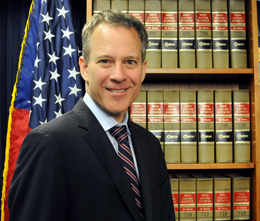 AGs Highlight Success Of Tough State Usury Laws That Have Effectively Outlawed Payday Lending In New York, Other States
AGs Highlight Success Of Tough State Usury Laws That Have Effectively Outlawed Payday Lending In New York, Other States
Attorney General Eric T. Schneiderman announced Friday that New York and a coalition of seven other states submitted a letter in response to the Consumer Financial Protection Bureau’s (the “Bureau”) proposed rules for Payday, Vehicle Title and Certain High Cost Installment Loans (“Proposed Rules”).
In an effort led by Schneiderman, the attorneys general sent comments commending the Bureau for exercising its rule-making authority in an area that has a widespread impact on the lives of millions of financially vulnerable consumers across the nation.
“For too long, financially fragile consumers in New York and other states have been harmed by payday lenders who charge illegal and unconscionable interest rates,” Schneiderman said. “It is critical that we have strong rules to protect consumers. The Bureau’s Proposed Rules will continue to allow states with strong usury caps like New York to keep illegal payday lenders from doing business their states.”
New York state has passed some of the toughest lending laws in the country, which essentially make payday lending illegal in the state. New York’s civil usury law prohibits most non-bank lenders that are not licensed by New York state from charging more than 16-percent interest on small, unsecured loans. Lenders that are licensed by New York state cannot charge more than 25 percent under New York’s criminal usury laws. Lenders that set up their operations out-of-state, overseas, or on tribal lands in an attempt to evade state regulation are still subject to New York laws when lending to New York consumers.
The Bureau’s proposed rules require lenders to evaluate consumers’ ability to repay the loan in some, but not all circumstances. While the rule is significant in states without existing consumer protections, the attorneys general urged the Bureau to make clear that, if enacted, the proposed rules should not be used to undermine more stringent state protections and enforcement efforts that have proven so effective in combating predatory lending. In fact, usury caps are the most effective means of ending the harms of payday and other high interest consumer lending.
The harm to consumers resulting from payday lending is astounding:
- Payday lending had a negative impact of $774 million in 2011, resulting in the estimated loss of more than 14,000 jobs. In addition, U.S. households lost an additional $169 million as a result of an increase in Chapter 13 bankruptcies linked to payday lending usage.
- Approximately one-third of borrowers default within six months of their first payday loan and almost half of borrowers default within two years of their first payday loan.
- Consumers who take out payday loans often suffer the additional effects of difficulty paying bills, delayed medical spending, involuntary bank account closure, increased likelihood of filing for bankruptcy, and decreased job performance.
According to the Center for Responsible Lending, states without payday and car title lending save an estimated $5 billion annually in fees. New York has saved an estimated $790 million annually.
Schneiderman’s letter is joined by seven other states that have strong usury caps effectively banning payday lending: Connecticut, Maryland, Massachusetts, New Hampshire, Pennsylvania, Vermont and the District of Columbia.
